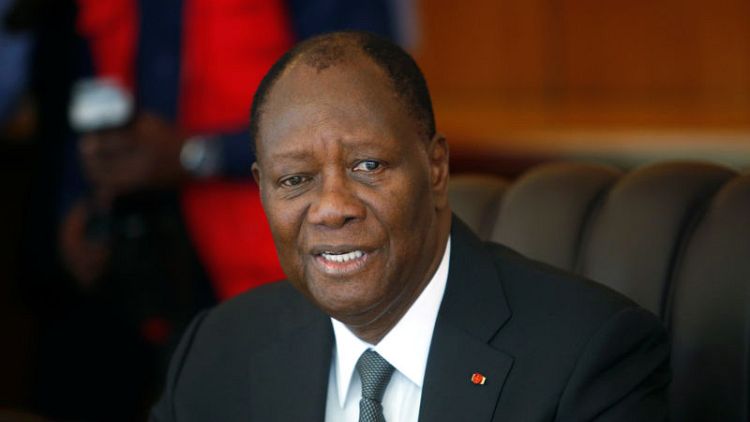ABIDJAN (Reuters) - Ivory Coast President Alassane Ouattara sought to play down divisions within his ruling coalition on Wednesday, calling on Ivorians to maintain the country's hard-won peace ahead of 2020 elections that many fear could again turn violent.
Ouattara re-jigged his government this week because of a row between his RDR party and its governing partner, former President Henri Konan Bedie's PDCI, although the changes announced on Tuesday turned out to be largely cosmetic.
"I hear talk here and there that there are political tensions," he said after his new administration's first cabinet meeting. "It's not true. Ivory Coast wants to move forward."
The RDR and PDCI, whose support was critical to Ouattara's run-off victory in 2010 and re-election in 2015, fell out over the PDCI's insistence that it be able to choose the candidate for a joint ticket in 2020.
The RDR rejects that position. Ouattara, who is due to step down after the election, has also upset the PDCI by saying that he has the right to seek a new mandate despite term limits that appear to bar him from standing again.
Some political analysts doubt Ouattara's awarding of a handful of extra posts to the PDCI in the new government will be enough to mend the relationship.
Ouattara said he would elaborate on plans "to unite the entire nation" in a speech next month.
The row has further agitated the perenially volatile politics of Ivory Coast, where a tenuous stability has held since a brief civil war in 2010-11 that killed 3,000 people.
Before that war, which followed Ouattara's victory at the polls, Ivory Coast was divided between a government-controlled south and rebel-held north for close to a decade.
Ivory Coast, the world's top cocoa grower, has since recovered its place as Francophone West Africa's leading economy, with gross domestic product (GDP) growing by 7.6 percent last year.
However, occasional flare-ups over land and ethnicity as well as a series of army mutinies over unpaid bonuses to former rebel soldiers have taken some of the shine off its economic achievements.
(Reporting By Loucoumane Coulibaly; Writing by Aaron Ross; Editing by Gareth Jones)
